S. Koreans condemn Japan's nuke wastewater dumping decision
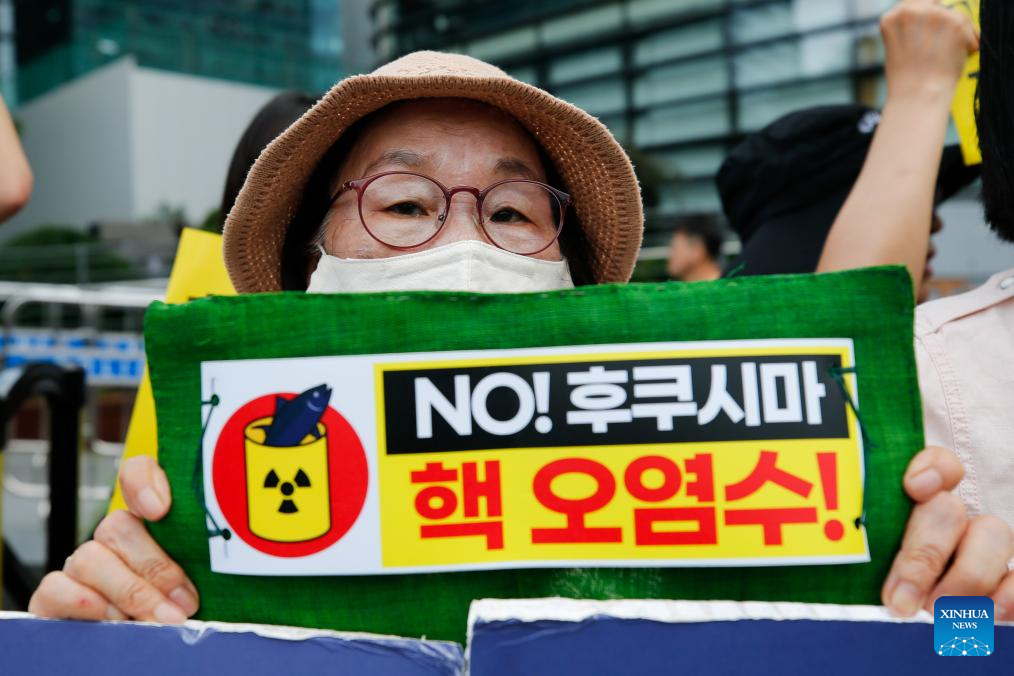
A man gathers to protest Japan's decision to start releasing nuclear-contaminated wastewater near the Japanese embassy in Seoul, South Korea, Aug. 22, 2023. Despite public concerns and raging opposition from both home and abroad, the Japanese government said Tuesday it has decided to start releasing nuclear-contaminated wastewater from the crippled Fukushima Daiichi Nuclear Power Plant into the ocean on Thursday. (Xinhua/Wang Yiliang)
SEOUL, Aug. 22 (Xinhua) -- South Korean activists and politicians on Tuesday condemned Japan's decision to start dumping nuclear-contaminated wastewater from the crippled Fukushima Daiichi nuclear power plant into the ocean later this week.
A group of green activists gathered near the Japanese embassy in Seoul, shouting slogans of "Dead against Japan's maritime release of nuclear-contaminated wastewater," and "Immediately retract the maritime discharge decision."
Against the backdrop of placards that read "Dead against the maritime discharge," Lee Jeong-yun, president of the Nuclear Power Safety and the Future organization, said that Fumio Kishida became the first Japanese prime minister to grant the dumping of radioactive wastewater into international waters since the 1972 London Convention on the Prevention of Marine Pollution by Dumping of Wastes and Other Matter.
The activist noted that Kishida will go down in history as a name tainted with the nuclear-contaminated wastewater dumping done by Japan.
It is a crime to dump nuclear-contaminated wastewater, said Lee, urging the Japanese government to withdraw its ocean discharge plan, actively carry out international cooperation and commit to keeping nuclear-contaminated wastewater on land.
The Japanese government announced earlier in the day that it decided to start discharging the Fukushima nuclear wastewater on Thursday despite wide criticism from both home and abroad.
Hit by a massive earthquake and an ensuing tsunami in March 2011, the Fukushima power plant suffered core meltdowns and generated a massive amount of water tainted with radioactive substances from cooling down the nuclear fuel.
"The decision to dump nuclear-contaminated wastewater into the ocean, made by Japan that has no interest in the responsibility as a global citizen or moral conscience as an advanced country, resembles Japan's militaristic aspiration in the past without any interest in human rights and human dignity," said Ha Ju-hui, secretary-general of MINBYUN-Lawyers for a Democratic Society.
Ha said Tokyo made the decision in clear violation of such international laws as the UN Convention on the Law of the Sea, expressing serious concerns that Japan's discharge could open a new path of history allowing other nations to ignore international laws and take no responsibility for damage to the environment, the ocean, and humankind.
Following the protest rally of the civic activists, over 20 lawmakers of the main opposition Democratic Party held a separate press conference near the Japanese embassy, harshly condemning the wastewater discharge decision.
"In what capacity do they throw nuclear waste into the ocean, a common asset of all humankind? What qualifications do they have? The ocean is a common resource for humankind, and water is the source of life. All humankind must live on it in the future," Woo Won-shik, a Democratic Party lawmaker, told the press conference.
"Japan, which decided to fill it with nuclear waste, will go down in history as the worst country and be condemned by all humankind," said Woo.
Democratic Party lawmakers separately staged a rally against the Japanese government at the parliamentary building.
During the rally, Democratic Party leader Lee Jae-myung said Japan eventually declared the "worst environmental destruction" by deciding to dump the nuclear-contaminated wastewater into the ocean without scientific verification, without the understanding of neighboring countries, and even without the consent of Japanese people.
Strongly denouncing Japan's reckless decision, Lee vowed to do everything to stop wastewater dumping through anti-dumping movements across the country and cooperation with the international community.
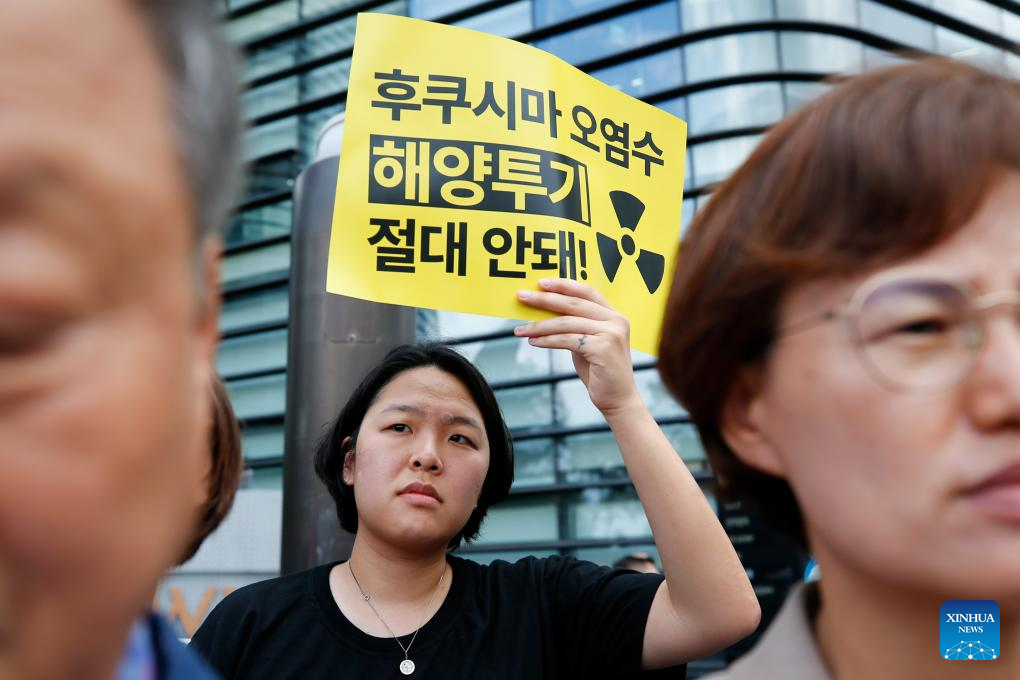
People gather to protest Japan's decision to start releasing nuclear-contaminated wastewater near the Japanese embassy in Seoul, South Korea, Aug. 22, 2023. Despite public concerns and raging opposition from both home and abroad, the Japanese government said Tuesday it has decided to start releasing nuclear-contaminated wastewater from the crippled Fukushima Daiichi Nuclear Power Plant into the ocean on Thursday. (Xinhua/Wang Yiliang)
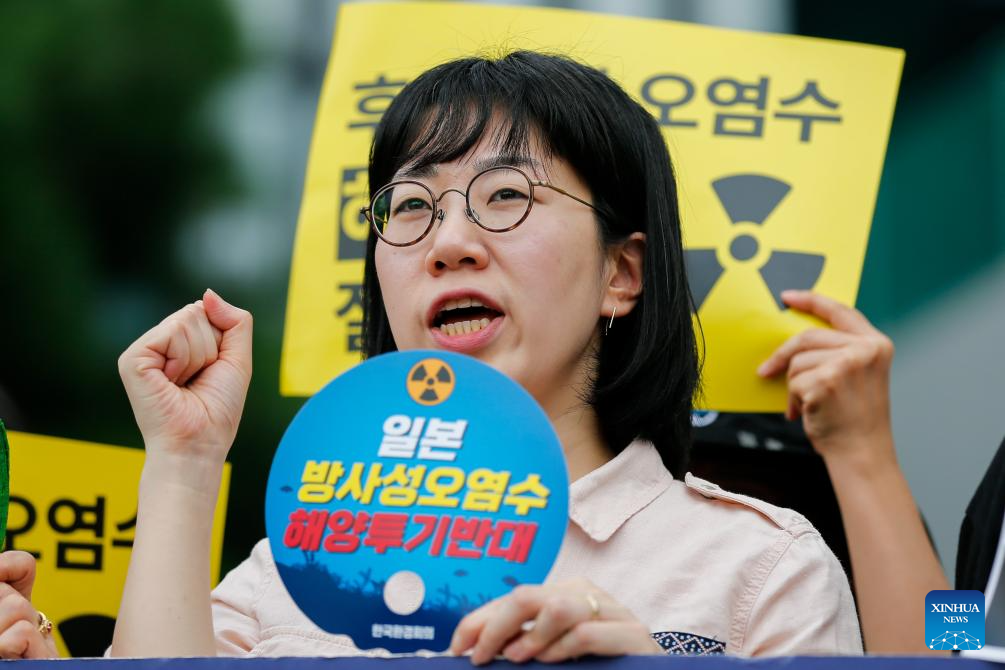
A woman gathers to protest Japan's decision to start releasing nuclear-contaminated wastewater near the Japanese embassy in Seoul, South Korea, Aug. 22, 2023. Despite public concerns and raging opposition from both home and abroad, the Japanese government said Tuesday it has decided to start releasing nuclear-contaminated wastewater from the crippled Fukushima Daiichi Nuclear Power Plant into the ocean on Thursday. (Xinhua/Wang Yiliang)

People gather to protest Japan's decision to start releasing nuclear-contaminated wastewater near the Japanese embassy in Seoul, South Korea, Aug. 22, 2023. Despite public concerns and raging opposition from both home and abroad, the Japanese government said Tuesday it has decided to start releasing nuclear-contaminated wastewater from the crippled Fukushima Daiichi Nuclear Power Plant into the ocean on Thursday. (Xinhua/Wang Yiliang)

People gather to protest Japan's decision to start releasing nuclear-contaminated wastewater near the Japanese embassy in Seoul, South Korea, Aug. 22, 2023. Despite public concerns and raging opposition from both home and abroad, the Japanese government said Tuesday it has decided to start releasing nuclear-contaminated wastewater from the crippled Fukushima Daiichi Nuclear Power Plant into the ocean on Thursday. (Xinhua/Wang Yiliang)
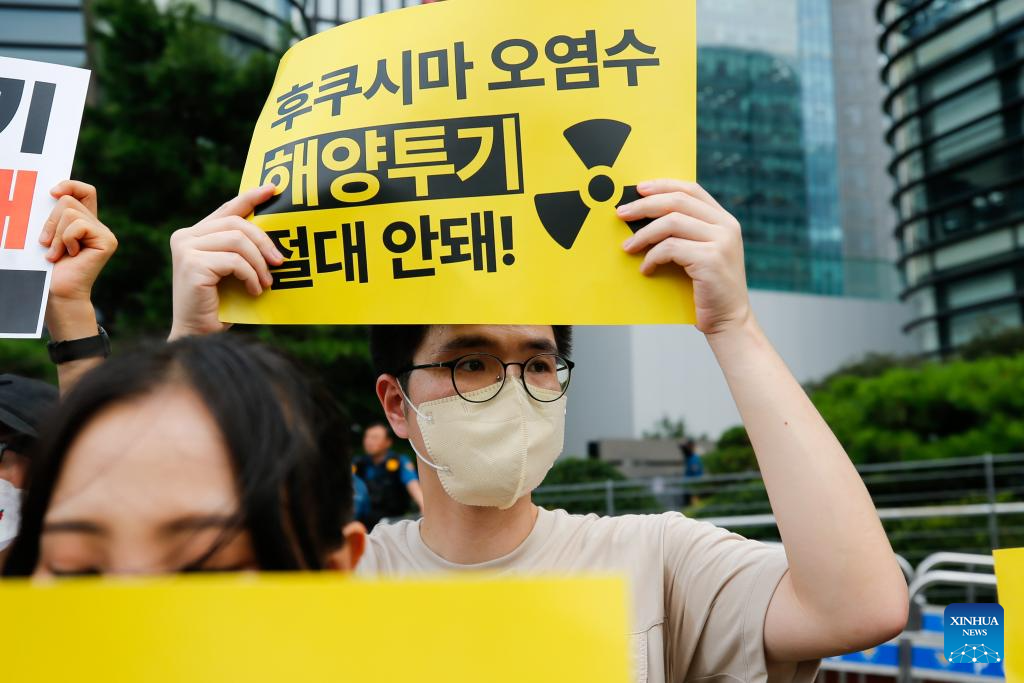
People gather to protest Japan's decision to start releasing nuclear-contaminated wastewater near the Japanese embassy in Seoul, South Korea, Aug. 22, 2023. Despite public concerns and raging opposition from both home and abroad, the Japanese government said Tuesday it has decided to start releasing nuclear-contaminated wastewater from the crippled Fukushima Daiichi Nuclear Power Plant into the ocean on Thursday. (Xinhua/Wang Yiliang)
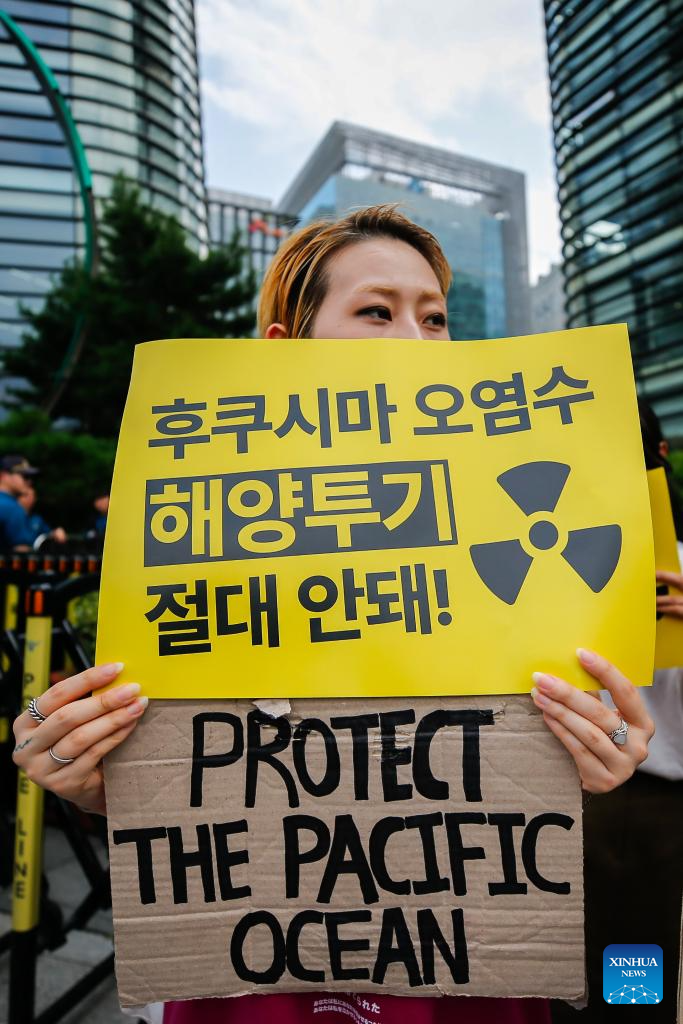
A woman gathers to protest Japan's decision to start releasing nuclear-contaminated wastewater near the Japanese embassy in Seoul, South Korea, Aug. 22, 2023. Despite public concerns and raging opposition from both home and abroad, the Japanese government said Tuesday it has decided to start releasing nuclear-contaminated wastewater from the crippled Fukushima Daiichi Nuclear Power Plant into the ocean on Thursday. (Xinhua/Wang Yiliang)
Photos
 View of Great Wall at starry night in N China
View of Great Wall at starry night in N China Groom in C China's Luoyang picks up bride with electric moped fleet
Groom in C China's Luoyang picks up bride with electric moped fleet Small railway station in N China's Inner Mongolia attracts throngs of tourists
Small railway station in N China's Inner Mongolia attracts throngs of tourists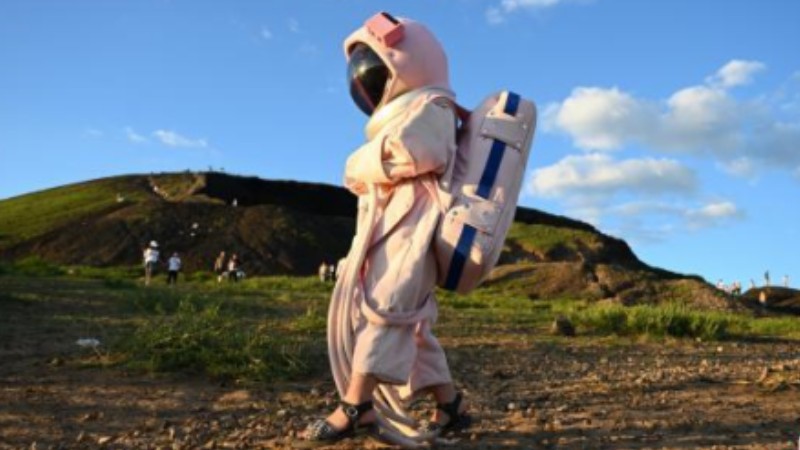 'Space suit'-clad tourists immerse themselves at extra-terrestrial-like landscape in China's Inner Mongolia
'Space suit'-clad tourists immerse themselves at extra-terrestrial-like landscape in China's Inner Mongolia
Related Stories
- Japan's move to discharge wastewater 'irresponsible'
- Japan announces ocean discharge of Fukushima nuke wastewater amid protests
- S. Korea's opposition party denounces Japan's radioactive wastewater dumping plan
- Japan to start ocean discharge of Fukushima nuke wastewater Thursday
- Japanese fishery industry reiterates opposition to planned release of Fukushima radioactive wastewater into sea
Copyright © 2023 People's Daily Online. All Rights Reserved.





